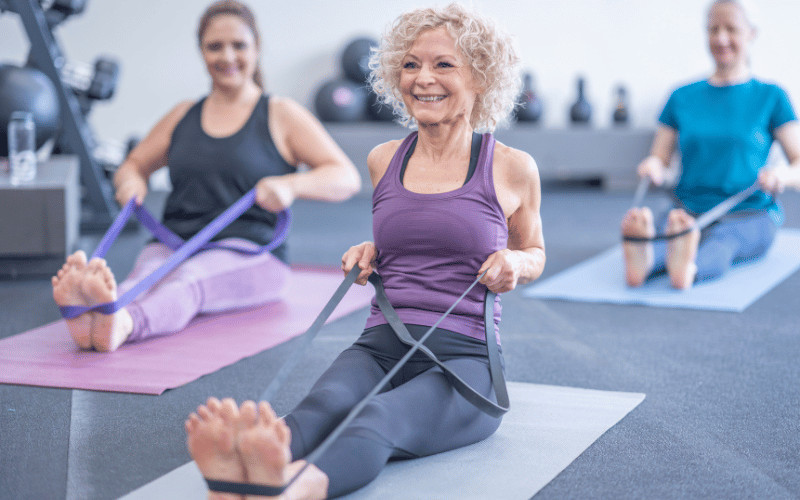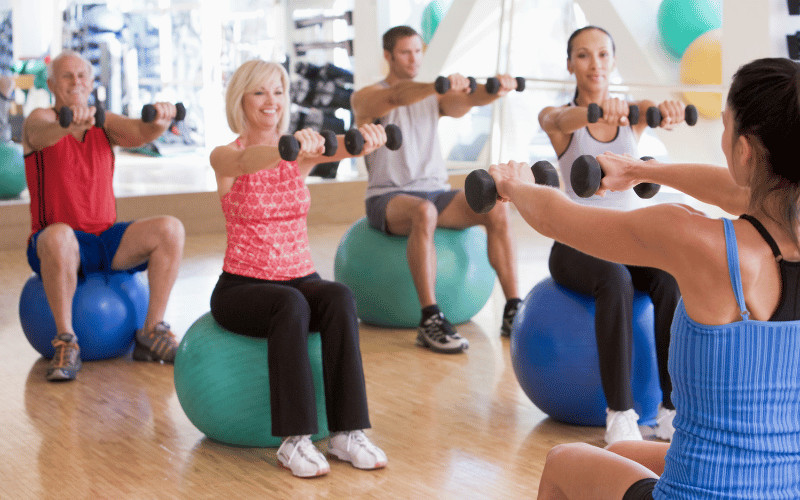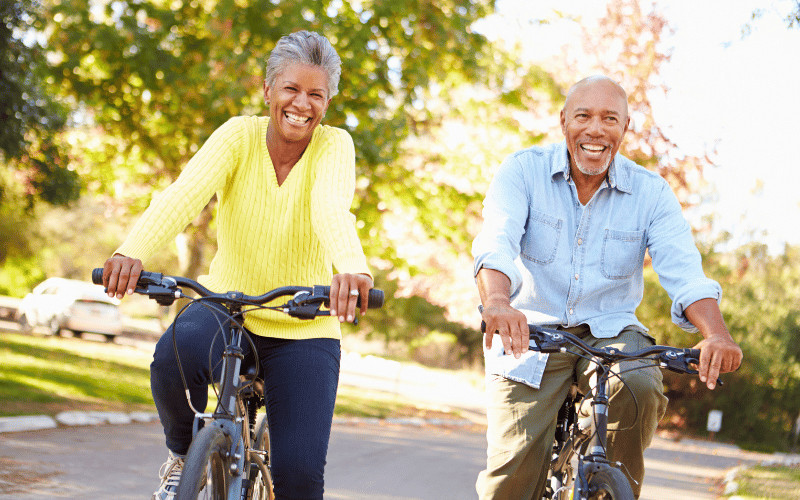As women age, they experience various health issues. Osteoporosis, heart disease, and arthritis are some of the first that come to mind. Regular exercise helps prevent or manage some of these conditions and also has many other benefits.
Bone Density
First let’s consider bone density. Exercise, especially weight bearing exercise, or resistance training as it is sometimes called, can strengthen your bones. With increased stress placed on the bones by adding weight and resistance, bones increase their density. With increased bone density comes a reduction in bone fractures, like fractures of the wrist, forearm, and hip.
Regular Exercise Reduces Joint Pain
When you exercise moderately, you move your joints to help keep them lubricated with synovial fluid. This is a thick fluid with an egg white-like consistency that lubricates and reduces friction between the joints.
Some exercise that is especially good for your joints are:
- Stretching
- Resistance training
- Heel raises.
Regular Exercise Improves Your Mood
Thirty minutes of moderate exercise every day should increase the feel-good hormones
called endorphins.This helps reduce stress, depression, and anxiety. It can also boost your creativity and memory.
Regular Exercise Increases Your Metabolism
Women over 50 should exercise to maintain a healthy weight and reduce the risk of obesity and health related issues that come with obesity.
Cardio Exercise
When you do cardio or aerobic exercise, you strengthen the heart, veins, and lungs. This, in turn, helps lower blood pressure and improves cholesterol levels.
Sarcopenia
Sarcopenia, according to Harvard Medical School, is a natural loss of muscle after the age of 30. You can lose 3% to 5% of your muscle mass each decade. This may increase your risk of falls and injury. But is muscle loss inevitable? Is there anything that can be done to prevent this from happening?
Benefits of Exercise for Women Over 50
As we age, our bodies begin to lose muscle mass – that is, unless we do something about it! Dr. Thomas W. Storer, director of exercise physiology and physical function lab at Harvard-affiliated Brigham and Women’s Hospital reminds us, “It takes work, dedication, and a plan, but it is never too late to rebuild muscle and maintain it.”
Dr. Storer recommends the best way to build muscle mass, regardless of your age, is through PRT – Progressive Resistance Training. Gradually increase your workout – weight, reps, and sets – to increase your strength and endurance.
Tips for Your Exercise Journey
Increase your protein. Protein is the king of Muscle Food! Protein is broken down into amino acids to build muscle. As you age, the phenomenon called anabolic resistance, lowers your ability to break down and synthesize protein. The National Institutes of Health recommends 0.36 grams of protein per pound for a sedentary person. A person with a physically demanding job would need more. You can find a protein calculator at this website.
Discuss your protein intake with your doctor before making dietary changes, as some medical conditions require a decreased level of protein. Your health practitioner will know what diet and physical activities are best for you.
How to Increase Exercise as You Age
You can try a variety of exercises as you age. Take it slow, and gradually increase your intensity and endurance. You may not want to begin with a high-intensity workout, but you will see the benefits of exercise as you progress.
It Is Not All About Strength!
Building muscle is not all about strength. It also includes power. In this context, power determines how fast and efficiently you move during the day.
Using your legs is a good way to improve muscle power.
Practice rising quickly from a chair, walking with a brisk walk, and holding on to the handrail and pushing off quickly as you climb the stairs. Begin stair-climbing at your own pace. Maybe at first take only one to three steps.
Some Recommended Low-Impact Exercises Are:
- Walking
- Bicycling
- Yoga
- Water Aerobics
- Fitness Classes
- Tai Chi and Qi Gong
- Resistance Training
- Squats, Lunges, and Push-ups are Good Body Weight Exercises.

Eleven Benefits of Exercise for People of Any Age.
- Keeps the mind sharp.
- Helps with weight management.
- Reduces the risk of Type 2 Diabetes
- Is a stress buster. – Relieves anxiety.
- Improves sleep.
- Adds variety to make living fun.
- Lubricates the joints. – reduces arthritis pain.
- Increases your sense of balance.
- Strengthens your muscles to reduce the risk of injury.
- Aerobic exercise can boost your healthy (HDL) cholesterol and lower your unhealthy cholesterol (LDL).
- Increases your longevity. Studies show that those who exercise regularly have a lower risk of dying of all causes, such as heart disease and some cancers.
Exercise and Aging
1. What is the Most Important Secret to Aging Well?
A strong positive attitude is the most important trait you can have as you age. It helps to reduce stress and promotes a healthy outlook on life.
2. What are the Worst Exercises for Seniors?
As a rule, high-impact exercises are not recommended for seniors. Things like deep squats, sit-ups, heavy running or sprints, intense stair-climbing, and standing toe-touches would be included as exercises seniors should avoid.
3. What Are Benefits of Exercise for Women Over 50?
Exercise is good for people of all ages. You need to start slowly and increase your pace and intensity. Weight-bearing exercises build strong muscles, bones, and increase metabolism. Cardio strengthens your heart, lungs, and lowers your LDL cholesterol. You increase your balance, stability, endurance, and overall health as you exercise your body.
4. Is It too Late to Exercise as an Older Adult?
You are never too old to start exercising. Consult your healthcare practitioner for tips on what is best for you. You will build strength in your body and refresh your mind. As Dr. Storer says “It takes work, dedication, and a plan, but it is never too late to rebuild muscle and maintain it.”
Aging and Fitness Quiz
True or False
True/False 1. Engaging in mental exercises and learning new skills is important for healthy aging.
True/False 2. Adequate sleep has no impact on healthy aging.
True/False 3. Healthy eating, moderate exercise, and avoiding junk food, smoking, and excessive alcohol consumption are some ways to prevent chronic diseases.
True/False 4. Regular medical check-ups and screenings are not important for healthy aging.
True/False 5. Maintaining good oral health can help prevent chronic diseases and promote overall physical health.
True/False 6. To prevent depression and anxiety, it is important to maintain a sense of purpose and community with family and friends.
Answers: 1. True, 2. False, 3. True, 4. False, 5. True, 6. True
Wrapping It Up
The benefits of exercise for women over 50 will be a better quality of life.
As the saying goes, “You will lose it if you don’t use it.” Regular exercise is an essential part of maintaining good health.
It is good for people of all ages. Start slowly – increase your pace as you progress.
Weight-bearing exercises build strong muscles, bones, and increase metabolism.
Cardio strengthens your heart, lungs, and lowers your LDL cholesterol. Exercise increases your balance, stability, endurance, and overall health.
Disclaimer: If you have any concerns or questions about your health, you should always consult with a physician or other healthcare professional. No content on this site should be substituted for direct medical advice from your doctor or other qualified healthcare practitioners. The information contained here is for informational purposes only. It is from my research and personal experience.
Related Posts
25 Healthy Habits and Hobbies to Boost Your Mood this Year
Let’s Get Healthy Together: 15 Tips How
How Can You Prevent Muscle Loss as You Age?
10 Tips for Gaining Muscle Mass After 50
Ways to Strengthen Older Bones


